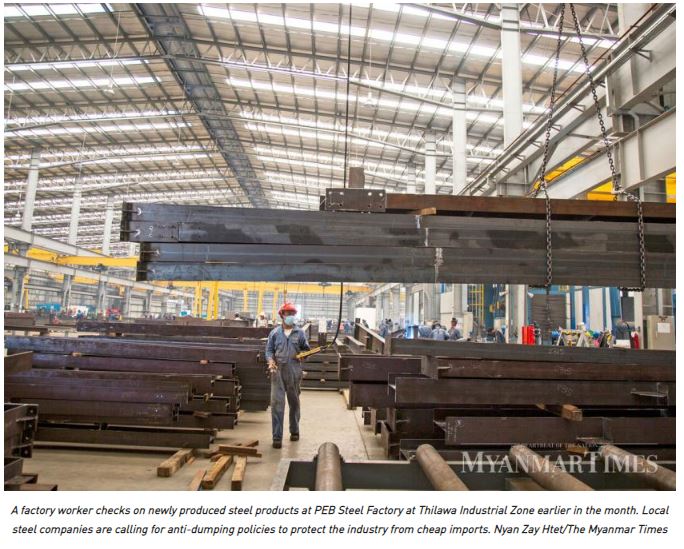Myanmar: Businesses call for policy changes to enable smoother operations
A February 22 meeting between the Private Sector Development Committee led by Vice President U Myint Swe and entrepreneurs from the Union of Myanmar Federation Chamber of Commerce and Industry (UMFCCI) saw the fisheries, steel-making, vehicle manufacturing and distribution and border trade promotion sectors call for policy changes to ease the challenges they face when doing business.
U Win Kyaing, secretary of the Myanmar Fisheries Federation (MFF), called for a simpler land use policy which can facilitate fish and prawn breeding but which also includes all other businesses that rely on land to conduct their operations.
He also requested to negotiate and settle the issues faced by fish farmers in Ayeyarwady and Mandalay who are still in the stage of land use applications and haven’t obtained the rights but who are being penalised by fines of K 1 million an acre.
As fish and prawn farming have been suspended and licenses have been banned in areas like Mandalay, the fish farms are deemed to be illegal. U Win Kyaing called for the fish and prawn farming activities to be legalised as well as for easier access to financing for the sector. He also stressed the need for a bilateral trade agreement between Myanmar and China to facilitate exports of local freshwater catfish across the border.
Dr Soe Tun, chair of the Myanmar Automobile Manufacturer & Distributor Association, highlighted that as the market is diluted by different types of cars and generic car parts which were imported in previous years, many in the industry are facing difficulties when buying and assembling automobile parts which are produced by original factories.
Under the car import policy of Myanmar, the import of used cars and car parts such as radiators, bumpers and lamps were permitted by the Road Transport Administration Department between 2011 and 2018. However, it has since said that the cars and parts must be original.
Dr Soe Tun pointed out that international car buyers regularly modify their cars by changing lamps, radiator parts and bumpers. As such, car modifications, which were once allowed in Myanmar, should be permitted again in line with international standards especially if it doesn’t interfere with road safety.
 Steel products are stored at a factory in Dangjin, South Korea on the west coast. Photo – EPA
Steel products are stored at a factory in Dangjin, South Korea on the west coast. Photo – EPA
“So, we request that the ministry set a deadline for issuing new directives amending these policies,” he said.
A proposal to impose the Safeguard Law and Anti-Dumping and Countervailing Law on iron and steel finished products and programs to provide a temporary solution to an existing oversupply of cheap imported products, was put forward by U Tin Hlaing, vice president of Myanmar Iron and Steel Association.
An anti-dumping duty is a protectionist tariff that a domestic government imposes on foreign imports that it believes are priced below fair market value. According to the ASEAN policy, which grants full exemption from tax and import permission for trade within the bloc, local businesses are losing market share and face being forced to shut down, U Tin Hlaing said.
He said that the governments of Thailand and Malaysia protect local businesses by imposing 25-30 percent anti-dumping duties on traders and that Myanmar, too, needs to implement such measures immediately to avert the collapse of the local iron and steel products market.
Meanwhile, there are only three trade border gates at the China-Myanmar border, which has led to congestion and bottlenecks at the gates and trade routes. To solve that, Border Trade Promotion Committee Member U Ko Ko Gyi under UMFCCI proposed opening more border gates to facilitate cross-border trade.
And as China has given six-month work visas to Myanmar workers, they should also allow border cross permits of up to six months as well, he said.
Currently, Myanmar workers going to China only have seven days border cross permits because of Myanmar’s passport procedures. As such, workers need to extend their permits every week, resulting in thousands of people having to wait in lines for the permit extension process. Besides, a permit extension costs around 80 yuan K15,000, which is really taxing for people and the respective immigration-related departments are also bogged down by workload, he said.
Source: https://www.mmtimes.com/news/businesses-call-policy-changes-enable-smoother-operations.html


 Thailand
Thailand




